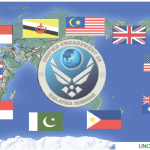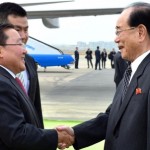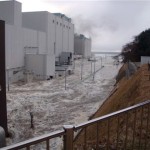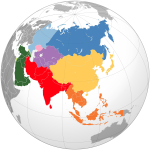- DETERRENCE: General Herbert J. “Hawk” Carlisle Commander, Pacific Air Forces, transcript
- DPRK: Agreements on Cooperation Between Governments of DPRK
- ENERGY SECURITY: The Buck Stops Nowhere
- GOVERNANCE AND CIVIL SOCIETY: Park proposes ‘Silk Road Express’ to Connect Eurasian Nations
- CLIMATE CHANGE ADAPTATION: Climate Change and Health: A Tool to Estimate Health and Adaptation Costs
- AUSTRAL PEACE AND SECURITY: The Nuclear War Scare of 1983: How Serious Was It?
 DETERRENCE: General Herbert J. “Hawk” Carlisle Commander, Pacific Air Forces, transcript, Defense Writers Group, July 29, 2013
DETERRENCE: General Herbert J. “Hawk” Carlisle Commander, Pacific Air Forces, transcript, Defense Writers Group, July 29, 2013
AirSea Battle “is cross-domain coordination; it’s cross-domain capabilities. It’s the ability to do it in a denied and contested environment. It covers everything. It covers training…it’s about buying things and it’s some of that, but that’s only part of it.…It’s doctrine. It’s organizations. It’s training. It’s exercising.”
- Rear Adm. Foggo Discusses Air-Sea Battle Concept, Navy Live, October 10, 2013
- Overview of the Air-Sea Battle Concept, J. Kelly, Navy Live, June 3, 2013
- AFNIC engineers play key role in CSAF’s Unified Engagement 2012 Wargame, (the 1st Air-Sea Battle war game to include participation by US allies), M. Hizer, Air Force Network Integration Center, March 28, 2013
 DPRK: Agreements on Cooperation Between Governments of DPRK, Mongolia signed. (North) Korea Central News Agency, (28 October 2013)
DPRK: Agreements on Cooperation Between Governments of DPRK, Mongolia signed. (North) Korea Central News Agency, (28 October 2013)
Kim Jong-un hosted his first Head of State visit – Mongolia’s President. Kim’s choice of a “third neighbor” was a safe avenue to bolster Kim’s domestic standing, access capital investment and indirectly signals that North Korea intends to set a foreign policy independent of (but not antagonistic to) China. Mongolia is also a mineral rich country with experience turning ground into gold. Refugees and goods only have so many paths out of North Korea.
- DPRK Delegate Re-Clarifies its Will to continue Launching Application Satellites, (North) Korea Central News Agency, (28 October 2013)
- Outward Migration Flows in the Event of Regime Collapse: An Interview with Dr. Go Myong-hun, Darcie Draudt, Sino-NK, (22 October 2013)
- Status And Future of the North Korean Minerals Sector. Edward Yoon, The Nautilus Institute (6 January 2011) [PDF, 420 KB]
 ENERGY SECURITY: The Buck Stops Nowhere, Editorial, Japan Times [12 September 2013]
ENERGY SECURITY: The Buck Stops Nowhere, Editorial, Japan Times [12 September 2013]
Splitting of the atoms has perhaps become the most divisive technology ever, and the biggest gamble ever, except to the warriors of the fight against global warming. Japan decides no criminal indictments will result from Fukushima investigations. Exxon-Mobil calls for more nuclear power, perhaps betting that it will guarantee oil and gas a firm foothold while the plants are built. As for a solution to limit GHG emissions, the “all of the above, including nuclear” is just a way of holding on to dreams of the past.
- TEPCO delayed tackling radioactive water in 2011 due to bankruptcy fears, Asahi Shimbun [18 September 2013]
- Nuclear freeze chills Japan’s cash-strapped utilities, Ben McLannahan, Financial Times [13 September 2013]
- Double nuclear by 2040 says Exxon, World Nuclear News [13 September 2013]
- Nuclear power: limits of compromise, Editorial, Guardian (UK) [15 September 2013]
 GOVERNANCE & CIVIL SOCIETY: Park Proposes ‘Silk Road Express’ to Connect Eurasian Nations, Yonhap (18 October 2013)
GOVERNANCE & CIVIL SOCIETY: Park Proposes ‘Silk Road Express’ to Connect Eurasian Nations, Yonhap (18 October 2013)
The ROK is proposing a trans-Asia railway connecting the Korean peninsula to Europe through Russia and China. The ROK is considering the use of the DPRK’s Najin Port via a partnership with Russia as a way of realizing this initiative, given the difficulties in the ROK-DPRK relationship. ASEAN leaders expressed their support of the ROK’s proposal for a Northeast Asia peace and cooperation initiative and actions to take by 2017 to deepen cooperation.
- North Korea Considers Suggesting Joint use of Najin Port, Dong-a Ilbo (25 October 2013)
- Park Wins International Support For Regional Trust-Building Vision, Yonhap (10 October 2013)
 CLIMATE CHANGE ADAPTATION: Climate Change and Health: A Tool to Estimate Health and Adaptation Costs, WHO Regional Office for Europe, World Health Organization – WHO (2013) [8.30 MB, PDF]
CLIMATE CHANGE ADAPTATION: Climate Change and Health: A Tool to Estimate Health and Adaptation Costs, WHO Regional Office for Europe, World Health Organization – WHO (2013) [8.30 MB, PDF]
This economic analysis tool supports health adaptation planning in European Member States. It provides guidance on estimating (a) the costs associated with damage to health due to climate change, (b) the costs for adaptation in various sectors to protect health from climate change and (c) the efficiency of adaptation measures, i.e. the cost of adaptation versus the expected returns, or averted health costs. The tool consists of a document describing the methods and a manual with an Excel spreadsheet, which is a visual aid for calculating costs.
- Protecting Health From Climate Change: A Seven Country Initiative, WHO Regional Office for Europe, World Health Organization – WHO (2013)
- Climate Change, Extreme Weather Events And Public Health – Meeting Report, WHO Regional Office for Europe, World Health Organization – WHO (2010)
 AUSTRAL PEACE AND SECURITY: The Nuclear War Scare of 1983: How Serious Was It?, Paul Dibb, Special Report, Australian Strategic Policy Institute (October 2013)
AUSTRAL PEACE AND SECURITY: The Nuclear War Scare of 1983: How Serious Was It?, Paul Dibb, Special Report, Australian Strategic Policy Institute (October 2013)
In 1983 the world stood on the edge of the nuclear abyss without our American ally even realising it. What do we learn from all this? That America could get it so badly wrong. That the US understood little about Soviet decision-making processes or perceptions of the US. That the potential for dangerous stand-offs between China and the US requires us to not exaggerate China’s military.
- Can Australia Claim to be a Sovereign Nation?, Malcolm Fraser, The Age (21 October 2013)
- The Africa Pivot: America’s New Battleground, Jon Mitchell, Foreign Policy Journal (25 October 2013)
- The Continuing Silence on 4 Squadron SASR Operations in East Africa, Richard Tanter, Campaign for an Iraq War Inquiry (5 October 2013)
The Nautilus Peace and Security Weekly Report presents articles and full length reports each week in six categories: Austral security, nuclear deterrence, energy security, climate change and security, the DPRK, climate change adaptation and governance and civil society. Our team of contributors carefully select items that highlight the links between these themes and the three regions in which our offices are found—North America, Northeast Asia, and the Austral-Asia region.
Subscribe to NAPSNet to receive free weekly email reports
Editor
- Frederica Kreitzer (while Arabella Imhoff is on leave)
Contributors
- Deterrence: Peter Hayes
- Governance and Civil Society: Dyana Mardon
- Climate Change Adaptation: Saleem Janjua
- DPRK: Roger Cavazos
- Energy Security: Nikhil Desai
- Austral Peace and Security: Richard Tanter

